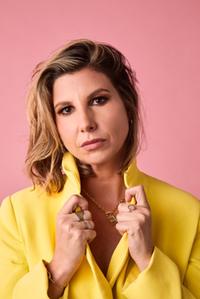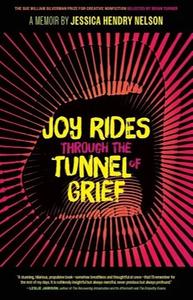
|
|
| photo: Monica Escamilla | |
Jessica Hendry Nelson is the author of the memoir If Only You People Could Follow Directions (Counterpoint), as well as Advanced Creative Nonfiction: A Writer's Guide and Anthology, with co-author Sean Prentiss (Bloomsbury Academic). Her work has appeared in the anthology Bending Genre: Essays on Creative Nonfiction, edited by Nicole Walker and Margot Singer, as well as Prairie Schooner, Tin House, the Threepenny Review, North American Review, the Los Angeles Review of Books and other publications. She teaches at Virginia Commonwealth University and in the MFA Program at the University of Nebraska in Omaha. Her newest book, Joy Rides Through the Tunnel of Grief (University of Georgia Press, September), won the AWP Sue William Silverman Prize in Creative Nonfiction. It is a memoir-in-essays that maps the boundaries of love, language, and creative urgency.
Handsell readers your book in 25 words or less:
For fans of women, dark humor, the show Fleabag, or inquiries into romantic friendships, ambivalence about childrearing, and the socialization of girls in the '90s.
On your nightstand now:
Milk Fed by Melissa Broder
The School for Good Mothers by Jessamine Chan
Mother Brain: How Neuroscience Is Rewriting the Story of Parenthood by Chelsea Conaboy
Great with Child: Letters to a Young Mother by Beth Ann Fennelly
I'm the mother of a 10-week-old baby girl, so I guess I'm on a bit of a motherhood kick.
Favorite book when you were a child:
Hard one! My dad turned me on to Steinbeck in my preteen years, for better or worse, and I loved The Pearl best of all. As a younger kid, I loved the Chronicles of Narnia and any story about a secret world hiding in plain sight. The Secret Garden is another one. It fit with my sense that the world I inhabited was only a veneer, that behind it were many more wondrous planes of existence. This is still my sense, more or less.
Your top five authors:
Oy. This I cannot do. Well, except Annie Dillard. I can confidently say that Annie Dillard is my favorite writer. Nobody writes sentences like Dillard. But here are five other writers I find myself returning to for inspiration again and again: Ross Gay, Claudia Rankine, Marilynne Robinson, Anne Carson, Kiese Laymon.
Book you've faked reading:
Ha! Probably a lot, but I can't recall a particular fake out. I am not ashamed to admit that I've never read Beowulf, The Iliad, or The Canterbury Tales. I am somewhat baffled that I've yet to read Lolita. I suppose I'm past the point of feeling a need to lie about having read something, though to list them all would require much more than my allotted word count.
Book you're an evangelist for:
So many! I think Teaching a Stone to Talk, Annie Dillard's collection of essays about nature and travel, is the book I've assigned to my writing students more than any other. It is a master class on seeing--really seeing--but also sentence construction, metaphor, and essay structure. Every time I read this book, I notice something different, something extraordinary about the craft of nonfiction. Also, her sentences make my heart ache.
 Book you've bought for the cover:
Book you've bought for the cover:
To celebrate their 70th anniversary in 2005, Penguin produced a series of Pocket Classics with really gorgeous, strange, inventive, sexy cover designs. I was in my early 20s then, and bought them one at a time as my budget allowed. I think I have about 40 of the 70 titles. My favorite cover is maybe Alain de Botton's On Seeing and Noticing.
Book you hid from your parents:
All of Anaïs Nin, although I probably didn't have to hide it. I was consistently embarrassed as a teenager.
Book that changed your life:
Jo Ann Beard's The Boys of My Youth. It was the first book I was assigned to read in college, and my introduction to creative nonfiction. It was also the first book I'd read that seemed to reflect my own people: our cynicism and self-destruction, fierce love, and dark humor. That Beard's people, so much like my own people, could be worthy of literature was a revelation. Prior to reading that book, I'd had a hunch that there was a story about my family worth telling, even though none of us are famous or rich or glamorous or notorious or even particularly unique. Beard's book showed me how to tell our stories.
Favorite line from a book:
Well, it's a few lines. They're from Annie Dillard's essay, "Living Like Weasels." (I may have the whole essay memorized, which is not as popular a party trick as you might imagine.) It's the last paragraph of the essay, the end of a long meditation sparked by a single encounter with a weasel in the woods, and the recitation of a story about a man who'd shot an eagle out of the sky only to discover a weasel's intact skull attached to the bird's throat.
"The supposition is that the eagle had pounced on the weasel and the weasel swiveled and bit as instinct taught him, tooth to neck, and nearly won," Dillard writes, which sets up this final paragraph, my favorite lines:
"I think it would be well, and proper, and obedient, and pure, to grasp your one necessity and not let it go, to dangle from it limp wherever it takes you. Then even death, where you're going no matter how you live, cannot you part. Seize it and let it seize you up aloft even, till your eyes burn out and drop; let your musky flesh fall off in shreds, and let your very bones unhinge and scatter, loosened over fields, over fields and woods, lightly, thoughtless, from any height at all, from as high as eagles."
Or maybe my favorite line comes earlier, simple and eloquent: "I could very calmly go wild."
It's a toss-up.
Five books you'll never part with:
This is a funny question because one of my (many) weaknesses is that I can't seem to part with books. They're like a very heavy, inconvenient security blanket. I've hauled giant Tupperware containers full of books through a dozen moves in nearly as many states over the last decade and a half. Only recently have I been able to pare down the collection by about half, which was a matter of necessity and common sense. But five I will never part with (aside from Annie Dillard's books, which I think I've evangelized enough here):
Anne Carson, Autobiography of Red. I read it at a seminal time in my young adulthood, when the formal and inventive possibilities it proffers blew my mind. (And still do.)
Kiese Laymon, Heavy. The best memoir I've read in the last decade.
Justin Torres, We the Animals. A slim, exquisite memoir with stunning prose, scene work, and voice.
Gretel Ehrlich, The Solace of Open Spaces. Chronicles Ehrlich's first three years living in Wyoming. Taught me how propulsive a rather plot-less book can be with clarity of vision.
Lidia Yuknavitch, The Chronology of Water. Another seminal book from early adulthood. Taught me how to plumb the intersection of grief and violence.
Book you most want to read again for the first time:
Oh, maybe Dept. of Speculation by Jenny Offill. Or Salvage the Bones by Jesmyn Ward. Or, or, or....

